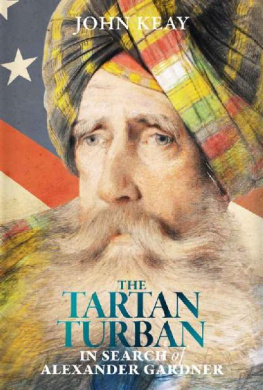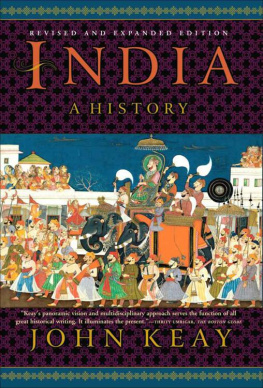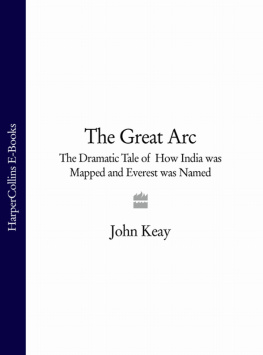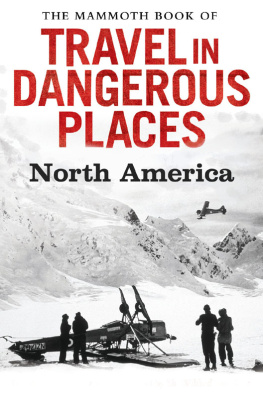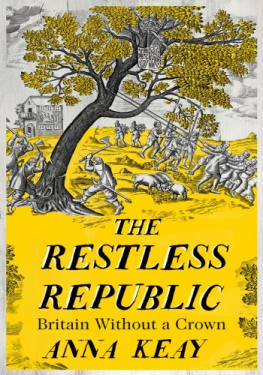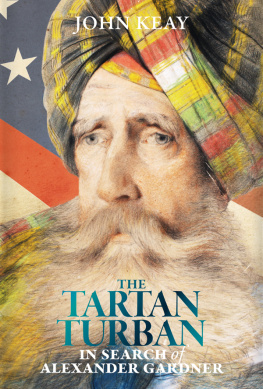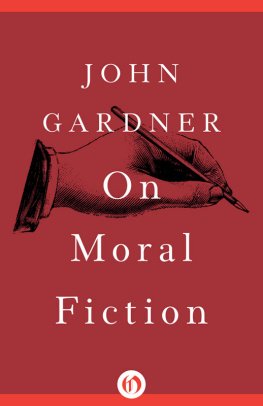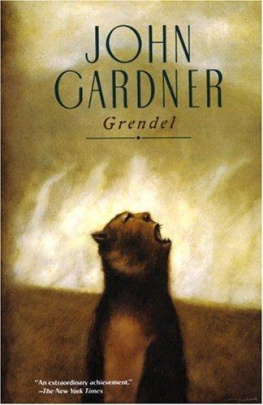John Keay - The Tartan Turban: In Search of Alexander Gardner
Here you can read online John Keay - The Tartan Turban: In Search of Alexander Gardner full text of the book (entire story) in english for free. Download pdf and epub, get meaning, cover and reviews about this ebook. year: 2017, publisher: Allison & Busby, genre: Detective and thriller. Description of the work, (preface) as well as reviews are available. Best literature library LitArk.com created for fans of good reading and offers a wide selection of genres:
Romance novel
Science fiction
Adventure
Detective
Science
History
Home and family
Prose
Art
Politics
Computer
Non-fiction
Religion
Business
Children
Humor
Choose a favorite category and find really read worthwhile books. Enjoy immersion in the world of imagination, feel the emotions of the characters or learn something new for yourself, make an fascinating discovery.
- Book:The Tartan Turban: In Search of Alexander Gardner
- Author:
- Publisher:Allison & Busby
- Genre:
- Year:2017
- Rating:5 / 5
- Favourites:Add to favourites
- Your mark:
- 100
- 1
- 2
- 3
- 4
- 5
The Tartan Turban: In Search of Alexander Gardner: summary, description and annotation
We offer to read an annotation, description, summary or preface (depends on what the author of the book "The Tartan Turban: In Search of Alexander Gardner" wrote himself). If you haven't found the necessary information about the book — write in the comments, we will try to find it.
The Tartan Turban: In Search of Alexander Gardner — read online for free the complete book (whole text) full work
Below is the text of the book, divided by pages. System saving the place of the last page read, allows you to conveniently read the book "The Tartan Turban: In Search of Alexander Gardner" online for free, without having to search again every time where you left off. Put a bookmark, and you can go to the page where you finished reading at any time.
Font size:
Interval:
Bookmark:
IN SEARCHofALEXANDER GARDNER
JOHN KEAY

For Amanda
whos been living with the colonel as long as anyone
Like all great travellers, said Essper,
I have seen more than I remember
and remember more than I have seen.
Benjamin DIsraeli, Vivian Grey
Contents
Illustrations
Family Trees
Timeline
Illustrations
).
).
).
).
).
).
).
).
).
.
).
Maps


Introduction
Alexander Gardner might reasonably be claimed as the most extraordinary of all the nineteenth centurys great adventurers. Well before more reputable explorers notched up their own discoveries in Inner Asia, this lone Scots-American had roamed the deserts of Turkestan, ridden round the worlds most fearsome knot of mountains and fought in Afghanistan for what he called the good cause of right against wrong.
As a hired gun transposed from the American West to the Asian East, for over a decade he had quartered the forbidden lands between what are now Turkmenistan and Chinese Xinjiang. He had survived arrest in Khiva, fled retribution in Samarkand, repeatedly forded the Oxus River (Amu Darya), and wintered in the unknown tundra of the Pamirs. Along the way he had been wounded on numerous occasions, had married an Afghan princess and had quickly been widowed.
At the time, the 1820s, no other outsider had managed anything remotely comparable. Single-handed, without any official support and without any geographical training, the Pamirs, if he hadnt, he couldnt possibly have invented it. When word of his feats filtered out thirty years later, geographers were agog.
Historians would be more intrigued by the aftermath of these travels. Thirteen years as a white-man-gone-native in Central Asia had been followed by fifteen years as a colonel of artillery in the employ of northern Indias last great native empire. Here, though the rewards were all he wished for, Gardner met his match in terms of gruesome encounters; the horrors on offer needed no embellishment. His insiders account of the death throes of the Sikh Empire, though somewhat demanding of the reader, would be substantially corroborated and has long since taken its place in the history books. One by one the contenders for the Sikh throne in Lahore were eliminated. Colonel Gardner not only observed the bloodshed but played his part in it. Often he was the only foreign witness to the carnage; throughout he lived in fear for his life.
When war with the British finally extinguished the Sikh Empire, Gardner again reinvented himself, this time as a British informant. Extricating himself from the treachery in Lahore, he survived to tell the tale and did sorepeatedly. In the course of a long and distinguished retirement in the valley of Kashmir the old colonel in the tartan turban became a minor celebrity, sought out by a new generation of explorers and quizzed by passing visitors as the survivor of a brutal, bygone age.
It is from what the colonel divulged to these latter-day disciples, many of them senior public servants, plus some garbled notes in his own hand, that the story of his early life and travels has generally been reconstructed. The nature of this source material leaves much to be desired. The colonels memory was fadinghe was by now in his seventieswhile his predilection for enlivening encounters remained unimpaired. Or as one reviewer would put it, his recollections were handicapped by adventure. Like Mr Essper in DIsraelis Vivian Grey, he had seen more than he remembered and remembered more than he had seen. Added to which, his listeners were not themselves infallible. Their different versions of his itineraries were hard to reconcile; the dates didnt match and the places didnt correspond. There were too many obvious exaggerations and far too many doubtful skirmishes. To a discerning few his story was beginning to look vulnerable.
Come an age when pioneering travellers were assumed to be upstanding and scrupulously honest, Gardner fell woefully short of the norm. The suspicious grew to doubt his nationality and even his identity; the scholarly felt insulted by his blatant fabrications; the virtuous accused him of having stooped to slave-dealing and butchery; and almost everyone found it hard to credit the extent of his travels. On his own admission he had first survived as an outlaw, then prospered as a mercenary. Neither calling deserved respect. Emphatically he was not, as some of his admirers contended, one of the finest specimens ever known of the soldier of fortune
By the 1890s, the greatest traveller of the century was being downgraded to travels greatest enigma. Reckoned less trustworthy even than Marco Polos Travels, Gardners exploits were increasingly shelved alongside the medieval marvels rehashed by Sir John Mandeville or the absurdities served up by Baron Munchausen. They belonged to what one authority called the apocrypha of travel. As a result, anthologies of exploration ignored him. So too, as recently as 1991, would The Royal Geographical Societys History of World Exploration.
But worse followed. As a result of some original research in the 1920s his character, already badly mauled, had been comprehensively assassinated. He was not, it was now suggested, an American freebooter but an Irish deserter. All his exploits had been lifted from the accounts of others. His itineraries had been composed by perusing an atlas. And his reputation in the Punjab had been as black as those of the parricidal rajas he served. In short the man was a prize liar. His deeds were barbaric and his story a myth concocted from easily verifiable sources.
Yet, nearly a century later, and after making due allowance for the revisionists perversity, he seemed worth one last look. The old colonel might still be who he said he was, and if his years in Sikh employ were genuine, then so might be his travels. Anyone with even a mildly romantic bent must surely take his side. So intriguing is his story, so nave his telling of it and so infectious his bravado that the reader feels duty bound to give him some benefit of the doubt.
That, very roughly, was the genesis of this book. In the hope that further research would bring greater rewards than awaited the quest for the colonels lost fortune, with which this book begins, the net was cast wideand, as it proved, wisely. Tentative lines of enquiry led to some unexpected documentation. The man was neither as elusive nor as unreliable as supposed. But major mysteries remained.
Then came a breakthroughthe discovery of several reports and lengthy papers written by Gardner himself. Instead of second and third-hand accounts, there existed first-hand testimony from the man himself. A crucial dimension was added to his story. Contentious episodes could now be seen from the colonels perspective and much of the rest could be reinterpreted in the light of these insights. The challenges faced by those who relayed his story to posterity also became clearer and their editorial compromises more apparent.
What follows does not claim to be a rounded biography. Nor is it a comprehensive vindication. Two hundred years after the tartan-clad colonel first climbed into the saddle, the chances of resurrecting the whole truth, andmore criticallynothing but the truth, are remote. Put-downs like those aired above need to be borne in mind. Some are still valid. The mysteries may be fewer, but the mystique of the worlds most endearing enigma lives on.
Font size:
Interval:
Bookmark:
Similar books «The Tartan Turban: In Search of Alexander Gardner»
Look at similar books to The Tartan Turban: In Search of Alexander Gardner. We have selected literature similar in name and meaning in the hope of providing readers with more options to find new, interesting, not yet read works.
Discussion, reviews of the book The Tartan Turban: In Search of Alexander Gardner and just readers' own opinions. Leave your comments, write what you think about the work, its meaning or the main characters. Specify what exactly you liked and what you didn't like, and why you think so.

